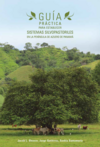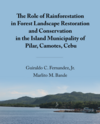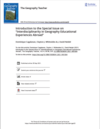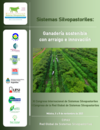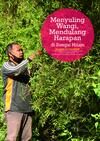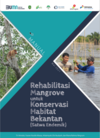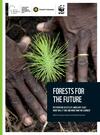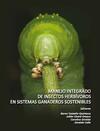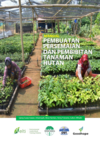You are here
Resources
We've compiled the following resources to assist our trainees and alumni. Also of note is our Tropical Restoration Library, a multidisciplinary source of knowledge and research to support restoration training, research, and implementation around the world.
ELTI Resource Documents
Other
September 7, 2022
Source: ELTI
Presentations from the Training on the Management and Monitoring of HCV-HCS Area in Oil Palm Plantations
This Indonesian-language pdf summarizes all of the PPTs that were used in the Training on the Management and Monitoring of HCV-HCS Area in Oil Palm Plantations, which was held in Sekadau, West Kalimantan, from August 10-11, 2022.
The conservation of forest areas within oil palm plantations to safeguard and enhance their High Conservation Values (HCV) and High Carbon Stocks (HCS) is a key requirement for sustainability certification through the Roundtable on Sustainable Palm Oil (RSPO). In order to fulfill this requirement, oil palm plantations need to implement a management and monitoring system for the HCV-HCS sites. For many oil palm plantations, however, the knowledge and skills needed to set up such a system fall outside their area of expertise. This training, therefore, aims to introduce the concept and best practices of HCV- HCS management and monitoring to relevant oil palm plantation staff.
Field Guides
May 1, 2022
Source: ELTI
Guía Práctica para Establecer Sistemas Silvopastoriles en la Península de Azuero de Panamá
Jacob L. Slusser (IATTC-ELTI Panama Coordinator), Jorge Gutiérrez (IATTC-ELTI Field Technician), and Saskia Santamaría (IATTC-ELTI Neotropics Associate) published Panama’s first practical guide in Spanish titled “Guía Práctica para Establecer Sistemas Silvopastoriles en la Península de Azuero de Panamá (Practical Guide to Establish Silvopastoral Systems in the Azuero Peninsula of Panama).” The guide provides detailed information about the five main components to designing and establishing silvopastoral systems (SPS) based on ELTI's 10+ years of experience in implementing SPS with cattle ranchers, community associations, and ELTI alumni from Panama's Azuero Peninsula. This open-access publication was made possible by the generous support of the Conservation, Food and Health Foundation (CFH).
Other
March 1, 2022
Source: VSU-ITEEM, VSU
The Role of Rainforestation in Forest Landscape Restoration and Conservation in the Island Municipality of Pilar, Camotes, Cebu
To commemorate the 24th anniversary of the establishment of Visayas State University’s Institute of Tropical Ecology and Environmental Management (ITEEM) (ELTI’s partner in the Philippines), the institute launched a book titled "The Role of Rainforestation in Forest Landscape Restoration and Conservation in the Island Municipality of Pilar, Camotes, Cebu." Rainforestation is a strategy for forest restoration and degraded land rehabilitation that focuses on the use of native tree species to deliver an array of economic and ecological goods and services. The book is co-authored by ELTI alumni and partners, Dr. Marlito Bande and Dr. Guiraldo Fernandez, Jr., and is the result of a three-year study on environmental management in the municipality of Pilar with support from Dr. David Neidel (World Agroforestry-ELTI), the local government unit of Pilar (when ELTI alumnus Eufracio Maratas, Jr. served as mayor), and Visayas State University.
Other
December 31, 2021
Source: The Geography Teacher
Introduction to the Special Issue on “Interdisciplinarity in Geography Educational Experiences Abroad”
Dominique Cagalananan (ELTI alumna, Executive Director of the EcoHealth Newtork, and assistant professor at Coastal Carolina University), Clayton Whitesides (assistant professor at Coastal Carolina University), and ELTI Asia Program Advisor David Neidel published an introductory article (open access) to a special issue (Volume 18, issue 3-4) of The Geography Teacher entitled, “Interdisciplinarity in Geography Educational Experiences Abroad.” The special issue (not open access) contains 14 manuscripts, including a survey article, research articles, and lesson plans. Cagalanan and Whitesides also published an article in this volume entitled, “Integrated International Field Trips Maximize Accessibility and Preserve Learning Value in an Age of Uncertainty,” discussing an experiential learning trip focused on forest restoration and degraded land rehabilitation that Coastal Carolina University was planning to take to Visaya State University (VSU) in the Philippines, facilitated by VSU-ELTI. Although the trip was cancelled due to COVID-19, the article underscores the benefits of partnering with on-the-ground institutions in highlighting local knowledge and maximizing place-based learning.
Conference Proceedings
November 18, 2021
Source: CIPAV
Lessons Learned about Generational Exchange in the Colombian Sustainable Cattle Ranching Project
Zoraida Calle (CIPAV-ELTI Colombia Coordinator) and Alicia Calle published an article in Spanish entitled, “Lessons Learned about Generational Exchange in the Colombian Sustainable Cattle Ranching Project (English translation),” for the open-access proceedings of the 11th International Silvopastoral Systems Conference held between November 3 and 5, 2021. The book contains the presentations between keynotes and those presented by the participants. The presentations are grouped into the following sections: 1) sustainable livestock, 2) strategies for adaptation, mitigation and resilience to climate change in the territories, 3) innovative livestock farmers in silvopastoral and agrosilvopastoral systems, and 4) generational change in the field—silvopastoral heirs. The Colombian Sustainable Cattle Ranching Project promoted the transition to silvopastoral systems on an unprecedented scale in Latin America. Although generational exchange was not an explicit objective of this project, concern from the technical team and participating farmers about the lack of generational renewal, was a motivation to open an intergenerational dialogue through the workshops offered to silvopastoral heirs. This article summarizes some findings and recommendations from various extension agents and scientists from the project, demonstration farm owners, and silvopastoral heirs, to integrate intergenerational dialogue as an essential objective of sustainable livestock projects. The following general recommendations are discussed in detail: 1. make contributions of young people visible, 2. strengthen their capacities, 3. generate opportunities for youth through activities that complement livestock production, and 4. create opportunities for them through knowledge generation processes.
Other
November 1, 2021
Source: ELTI and the Indonesian Research & Development Institute for Natural Resource Conservation Technology
Distilling Fragrance, Gaining Hope
ELTI’s Indonesia Program, in collaboration with the Indonesian Research & Development Institute for Natural Resource Conservation Technology (BALITEK-KSDA), published an article in the 2021, Vol X, No.1, issue of Suara Samboja (pp. 27–32), entitled, “Menyuling wangi, mendulang harapan (in English: Distilling fragrance, gaining hope).“ The article, written in Indonesian, discusses the potential for harvesting leaves from the Melaleuca cajuputi tree and distilling the essential oils, which are often used for medicinal purposes. ELTI has been working with BALITEK-KSDA and other partners in East Kalimantan to strengthen ecotourism and non-timber forest products as alternative livelihood strategies in support of forest restoration for the endemic proboscis monkey.
Other
May 31, 2021
Source:
Mangrove Rehabilitation for Proboscis Monkeys
ELTI’s Indonesia Program, in collaboration with the Research & Development Institute for Natural Resource Conservation Technology (BALITEK-KSDA), Blue Forests, Tropenbos Indonesia, and Pertamina Hulu Mahakam, published a manual in Indonesian entitled, “Rehabilitasi Mangrove untuk Konservasi Habitat Bekantan" (in English: "Mangrove Rehabilitation for Proboscis Monkey Conservation"). The authors are Tri Atmoko, Yusran Nurdin Massa, Arbainsyah, Elis Fauziyah, and Riana Rahma Ningrum.
Case Studies
May 21, 2021
Source: Prince Bernard Chair, Utrecht University, and WWF
Forests for the Future: Moving from Paper Commitments to Real Restoration Impact at Landscape Scale
A case study written by CIPAV-ELTI Colombia Coordinator Zoraida Calle, based at CIPAV, is featured in a book that brings together 21 articles written by restoration scientists and practitioners throughout the world. The book showcases insights from researchers and practitioners at the coalface of forest and ecosystem restoration on the greatest opportunities and fundamental challenges that will need to be addressed in different regions during the coming years.
Her article, entitled "Transitioning to Tree-based Grazing Systems in Colombia," explores the benefits of replacing conventional cattle ranching practices with complex silvopastoral systems, the challenges to this approach, and the necessity of integrating the perspectives of landholders.
Other
February 2, 2021
Source: CIPAV
Integrated Management of Herbivorous Insects in Sustainable Livestock Systems
This book, co-edited by three CIPAV colleagues and ELTI Colombia Coordinator Zoraida Calle, includes two chapters about El Hatico training landscape.
Other
October 21, 2020
Source:
Nursery Establishment and Vegetative Propagation Techniques
ELTI’s Indonesia Program, in collaboration with Tropenbos Indonesia, Goodhope Asia Holdings Ltd., and Operasi Wallacea Terpadu, published a booklet in Indonesian entitled, “Pembuatan Persemaian dan Pembibitan Tanaman Hutan" (in English, "Nursery Establishment and Vegetative Propagation Techniques"). Agustina Dwi Setyowati of BALITEK-KSDA helped with formatting this publication. The authors are Ujang Susep Irawan, Arbainsyah, Abrar Ramlan, Henry Putranto, and Sulton Afifudin.
Related Resources
ELTI Initiatives:
Yale School of of the Environment Initiatives:



